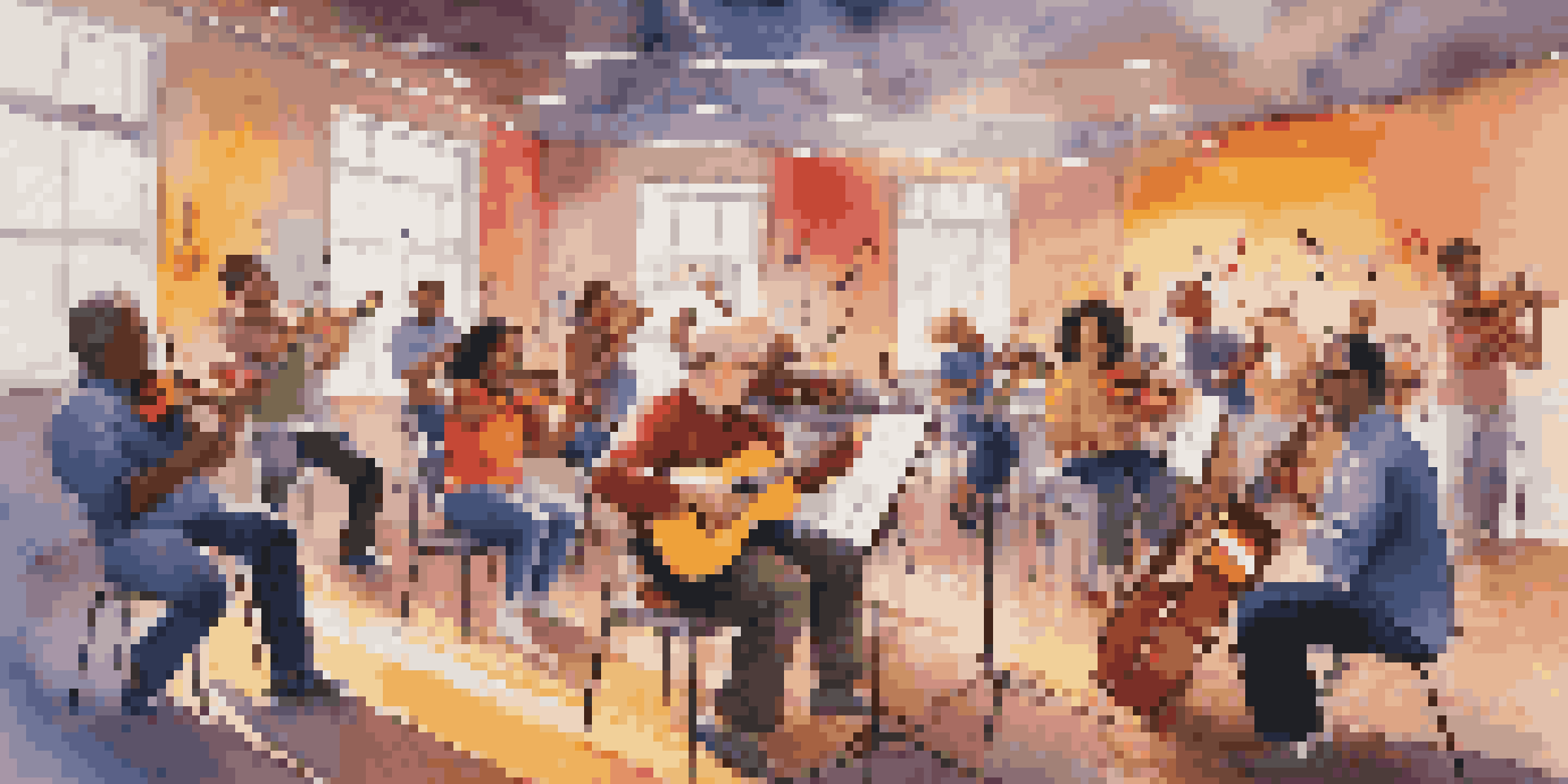The Benefits of Music Workshops for Mental Health Improvement

Understanding the Connection Between Music and Mental Health
Music has an incredible ability to evoke emotions and memories, making it a powerful tool for mental health improvement. Research shows that engaging with music can trigger the release of dopamine, the 'feel-good' neurotransmitter, which can help alleviate feelings of depression and anxiety. This makes music a natural ally in our pursuit of emotional well-being.
Music can change the world because it can change people.
When we participate in music workshops, we often find ourselves in a supportive environment where creativity can flourish. This safe space encourages individuals to express their feelings through music, fostering a sense of connection with others. It’s this communal aspect that can significantly boost our spirits and help combat feelings of isolation.
Moreover, the act of creating or playing music can serve as a form of mindfulness. It helps individuals focus on the present moment, reducing ruminative thoughts that often accompany mental health struggles. Through music, participants can find an escape from their worries, immersing themselves in the rhythm and melody.
Boosting Self-Expression Through Music Workshops
Self-expression is essential for mental health, and music workshops provide the perfect outlet for this. Participants are encouraged to share their thoughts and feelings through songwriting, improvisation, or simply jamming together. This creative process allows individuals to communicate emotions that may be difficult to articulate verbally.

In a supportive workshop setting, participants can explore their identities and experiences through their musical choices. Whether it's writing lyrics about personal struggles or collaborating on a piece, the act of creating music enables individuals to process their emotions. This form of self-expression can lead to increased self-esteem and confidence.
Music Boosts Mental Well-Being
Engaging with music can trigger dopamine release, alleviating feelings of depression and anxiety.
Additionally, the feedback and encouragement received from peers in these workshops foster a sense of belonging. Knowing that others resonate with your experiences can be incredibly validating. This shared journey not only enhances personal growth but also strengthens interpersonal relationships.
Enhancing Social Connections Through Group Music Activities
Music workshops often bring together individuals from diverse backgrounds, creating a unique opportunity for social interaction. Engaging in group activities like singing or playing in a band encourages teamwork and collaboration, making it easier to forge new friendships. These social connections can be vital for those feeling lonely or disconnected.
Where words fail, music speaks.
Participating in music as a group can also alleviate social anxiety, as the focus shifts from individual performance to collective expression. This shift allows participants to feel more comfortable and less judged, fostering an environment of acceptance and understanding. It’s amazing how harmony in music can translate to harmony in relationships.
Furthermore, the bond formed through shared musical experiences often extends beyond the workshop. Participants may find themselves connected through online platforms or local music events, creating a supportive community that continues to nurture their mental health journey.
Developing Coping Skills Through Musical Engagement
Music can serve as a coping mechanism for dealing with stress and emotional turmoil. In workshops, participants learn to channel their feelings into their musical creations, which can provide a productive outlet for pent-up emotions. This process can be incredibly therapeutic, allowing individuals to confront and process their challenges through music.
Additionally, engaging with music offers alternative coping strategies beyond traditional methods. For instance, participants might develop skills like improvisation, which encourages adaptability and quick thinking. These skills can translate into everyday life, helping individuals navigate stressful situations more effectively.
Workshops Enhance Self-Expression
Music workshops provide a supportive environment for individuals to express their emotions creatively.
Furthermore, the rhythm and structure found in music can offer a sense of stability and predictability. This can be particularly comforting for those experiencing anxiety, as it provides a grounding effect. By incorporating music into their coping strategies, individuals can build resilience and better manage their mental health.
Fostering Creativity and Problem-Solving Skills
Music workshops are a fantastic way to foster creativity, which is closely linked to mental health. Engaging in creative activities can boost mood and lead to innovative thinking. This is essential, as creativity allows us to approach problems from different angles, enhancing our problem-solving skills.
In a workshop setting, participants are often encouraged to think outside the box. Whether it’s coming up with unique melodies or finding solutions to musical challenges, this creative freedom can ignite a spark of inspiration. This process of exploration can invigorate the mind and foster a sense of accomplishment.
Moreover, as participants collaborate with others, they learn to appreciate different perspectives. This collaboration not only enriches their musical experience but also enhances their ability to work with others in various aspects of life. The creative skills and teamwork developed in these workshops can have lasting benefits beyond the music.
Promoting Mindfulness and Stress Reduction Through Music
Mindfulness is a powerful practice for mental health, and music can be a wonderful gateway to achieving it. Many music workshops incorporate elements of mindfulness, such as focusing on breathing or being present in the moment while playing an instrument. This practice helps participants cultivate awareness, which can lead to reduced stress levels.
Listening to music can also be a form of mindfulness. When participants engage in active listening, they learn to appreciate the nuances of sound, rhythm, and emotion. This heightened awareness can provide a sense of calm and tranquility, making it easier to cope with everyday stressors.
Fostering Connection Through Music
Participating in group music activities helps build social connections and alleviate feelings of loneliness.
Incorporating music into mindfulness practices can create a holistic approach to mental health improvement. Whether it’s through meditation with soothing melodies or using upbeat tunes to lift one’s spirits, music becomes a versatile tool for fostering mental well-being.
Celebrating Achievements and Personal Growth in Workshops
One of the most rewarding aspects of music workshops is the opportunity to celebrate personal achievements. Whether it’s mastering a new instrument or composing an original piece, recognizing these milestones can significantly enhance self-esteem. This sense of accomplishment can be especially impactful for individuals facing mental health challenges.
Celebration doesn’t only occur on an individual level; it’s often a communal experience. Workshops frequently culminate in performances or showcases where participants can share their musical creations with others. This public acknowledgment fosters a sense of pride and community, reinforcing the positive impact of the workshop on mental health.

Ultimately, the journey of personal growth in music workshops extends beyond the music itself. The skills and confidence gained through these experiences can empower individuals to tackle challenges in other areas of their lives. By celebrating achievements, participants are reminded of their resilience and ability to overcome obstacles.